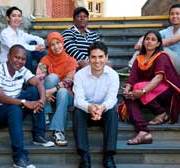07 October 2015
 The success of South Australia’s transition to an economy built on innovation will depend upon its community feeling confident enough to engage with new Asian markets, without being inhibited by cultural differences.
The success of South Australia’s transition to an economy built on innovation will depend upon its community feeling confident enough to engage with new Asian markets, without being inhibited by cultural differences.
That is the message from Dr Amrita Malhi, Research Fellow, International Centre for Muslim and non-Muslim Understanding, who is a keynote speaker at a conference: Learning to Live Together in Culturally Diverse Societies, convened by The Hawke EU Centre for Mobilities, Migrations and Cultural Transformations, in collaboration with the Centre for Research in Education.
As a researcher who has been leading a push for greater preparedness for cultural engagement with Asia, through events such as InterculturAdelaide, Dr Mahli is also drafting a report for the State Government on interculturality and says we cannot underestimate the links between cultural understanding and rapport and innovation.
"Building intercultural capacity is a great way to drive innovation, because it gives people the skills to work together without being thrown off by cultural difference,” Dr Malhi says.
"As South Australia undergoes a transition to future industries and looks for new Asian markets and investment, it will be useful if our community feels at home in Asia, ready to harness the benefits that our own diversity can bring to those business relationships.
“If we explore the policy framework of multiculturalism, we can see it has delivered major benefits to Australian society. Most Australians' experience of multiculturalism is overwhelmingly positive.
"All the same, we could benefit from considering new policy innovations that emphasise better forms of engagement across various forms of cultural difference, not only within Australia, but in our relationships with our Asian neighbours.
“As South Australians work to transform the economy through innovation and trade, it is important that we are ready to relate to each other across our many cultural backgrounds, within our Asian environment.
“Improved levels of interculturality will also position us to take better advantage of the opportunities now on offer from our neighbours in China, India and Southeast Asia--three priority areas for the state.”
The conference will also focus on how schools teach for cultural diversity and human rights at a time when there are huge movements of populations from different cultural backgrounds around the world, convener Professor Robert Hattam says.
“Australia and many EU countries now face significant challenges as a result of dramatic increases in the flow of people from many different countries. The rapidity of this shift in population can cause tensions around ethnic and cultural difference but the better prepared communities are for difference, the better they can adapt,” Professor Hattam says.
“Educational institutions, as important sites for identity and social formation, are key players in sustaining the social cohesion of nations.”
“There are significant benefits for researchers, teachers and policy makers from an EU/Australia dialogue about learning to live together in increasingly culturally diverse societies.”
The Learning to Live Together in Culturally Diverse Societies Conference will take place on October 8, 9.00-4.30pm at Magill Campus.
Media contact: Will Venn office (08) 8302 0096 email will.venn@unisa.edu.au.


